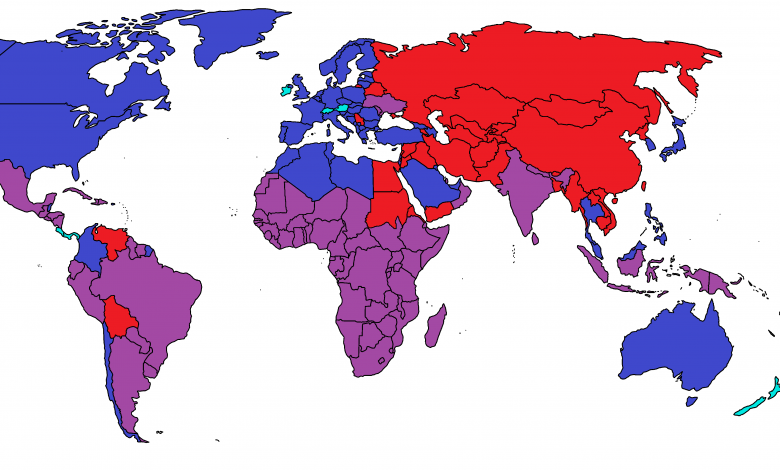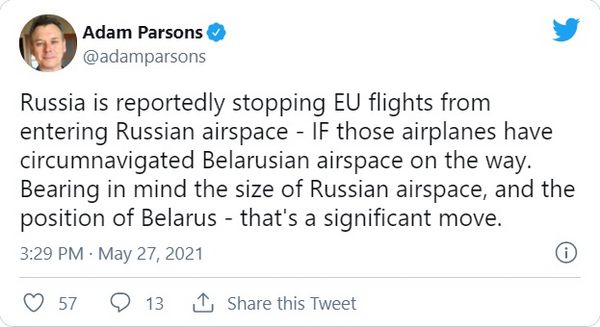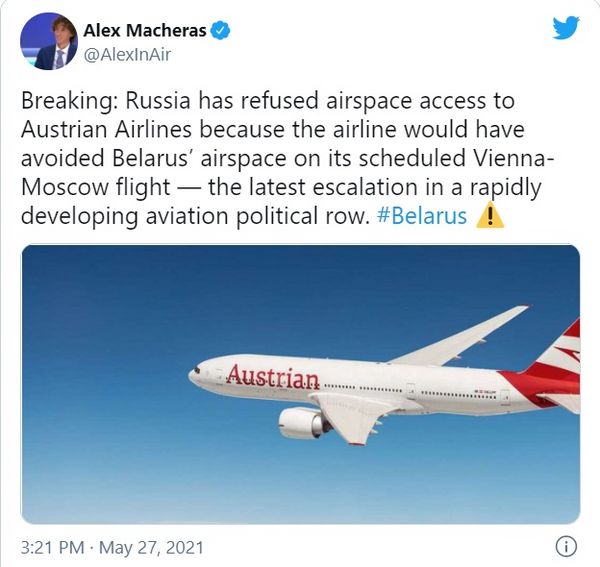East and West drifting further apart

The geopolitical situation in Eastern Europe is becoming increasingly tense, not only because there are signs of tighter Western sanctions against the Russian Federation, but also because the political tug-of-war over Belarus seems to have reached a new level. Regime change in Moscow? Soon exclusion of Russian banks from the international SWIFT system? No-fly zones over Eastern Europe and Russia? In addition, there was a green light for an expansion of Russian gold purchases!
EU Draft Resolution Calls for Regime Change in Russian Federation
As the European continent looks forward to the summer months and a possible brightening of the weather, there are signs of a massive escalation of the situation in bilateral relations between the European Union, the Russian Federation and Belarus. The recent publication of a draft resolution by the European Parliament is likely to have contributed to this.
Among other things, this draft resolution calls for “regime change” in the Russian Federation. At the same time, certain measures are discussed in which way such a goal could be achieved. The feasibility of the demands made in the paper linked above is doubted in many quarters, since it is not parliaments and their deputies but governments – and thus the executive branch – that are responsible for shaping Western foreign policy.
At the same time, it is pointed out that in the case of the European Parliament, it is no more than a “puppet parliament” whose deputies have, in real terms, only a very small degree of political power. Political power is in the hands of appointed – and thus not legitimized by a prior election – Commissioners of the European Commission.
In light of current events, it may hardly come as a surprise that the draft resolution that has since been introduced to the European Parliament was penned by Andrius Kubilius, a former prime minister of Lithuania. It is especially the small countries of the Baltic States, which – apart from their role in the Minsk coup attempt – continue to create sentiment against the Russian Federation within the European Union.
Affair with Belarusian regime critic Protasevich another point of contention
However the draft resolution may have been received in the Russian Federation and Belarus, Adam Parsons, Europe correspondent for Sky News, reported last week that there was also a clear escalation in foreign relations between the European Union and the Russian Federation in another area.
This escalation could be traced back to the recent forced landing of a Ryanair plane and the subsequent arrest of Belarusian regime critic Protasevich and his partner.

In the meantime, it has been observed that European airlines are avoiding overflight of Belarusian airspace as far as possible. Referring to the British broadcaster Sky News, the Moscow government has now banned those airlines based in the EU area from entering Russian airspace – and thus overflying it – if these airlines have previously flown around Belarusian airspace.

General air operations could could face hard damage
Other observers warn that this could be the start of a “battle” for the right of an overflight of Eastern European and Baltic airspace, after a number of other states in the region have now banned Belarusian state airline Belavia from flying over their own airspace following recent incidents.
At the same time, there are calls in the European Union for sanctions against Belarusian leader Alexander Lukashenko to be extended. If the current situation continues to deteriorate, such a development is likely to prove highly unwelcome from the point of view of economic activities in both EU countries and Belarus and the Russian Federation.
General airline operations, which have begun to recover somewhat over the course of the last few weeks, are likely to be particularly hard hit by this. A commentary by Rabo Bank last week on the situation currently developing in Eastern Europe stated as follows:
Either the EU will cave in to the current conflict or will eventually have to face the fact of losing more than just access to Belarusian airspace. Moreover, ninety percent of all goods delivered by train to the EU from the People’s Republic of China pass through Belarus. From the EU’s point of view, the only alternative would be to go on the offensive and prohibit airlines based in the EU from flying over Belarus and the Russian Federation in order to encourage the Moscow government to persuade Lukashenko, the head of state in Minsk, to change his tactics. However, anyone who builds the foundation of his own economy on importing natural gas from the Russian Federation in order to deliver luxury vehicles to Russia himself in return recognizes that this is a dubious conception of realpolitik.
SWIFT access a recurring matter
A report published yesterday by Russian broadcaster RT said that Russian banks could soon be denied access to the international SWIFT system. Such a measure could well be part of the West’s tightening sanctions against the Russian Federation.
The result could be an out-of-control sanctions spiral into which the West and the Russian Federation threaten to slide. The RT report refers, among other things, to statements by Dmitry Birichevsky, Director of the Department for Economic Cooperation in the Russian Foreign Ministry.
According to the report, it is no secret that the United States, in particular, has been issuing threats to the Moscow government based on the potential disconnection of Russian banks from the international SWIFT system.
Nevertheless, Dmitry Birichevsky, in an interview to the Ria Novosti channel, expressed his conviction that – at least in the foreseeable future – there would be no such escalation of sanctions between the two sides.
Even if at some point there is a forced disconnection of Russian banks from the international SWIFT system, he said, referring to Dmitry Birichevsky, it will be possible for his own country to easily agree on new payment arrangements with the numerous trading partners of the Russian Federation.
In a number of reports on this subject, I had pointed out to you that after building its own payment and transaction system, the Russian Federation now seems to be able to leave the international SWIFT system if necessary.
Dmitry Birichevsky added that over the course of the last few years, the Russian Federation has been working on its own payment processing system called SPFS, which already exists at home. Currently, work is being done to expand this system internationally.
For example, everyone in the Russian Federation already uses the so-called MIR card, which is also already accepted for payment purposes in a number of neighboring countries and Turkey. Other partner countries would probably be added soon after the conclusion of the current negotiations.
Nevertheless, the Moscow government had warned in the past against perceiving a possible exclusion from the international SWIFT system as a “declaration of war.”
Bill signed: National sovereign wealth fund now allowed to invest in precious metals
In the meantime, in order to make itself even less dependent on the U.S. dollar in terms of currency in the future, the Russian government has also signed a bill that has been in the pipeline since last November, the adoption of which will now officially allow the National Sovereign Wealth Fund to invest in both physical gold and silver.
Russia’s State Wealth Fund currently manages assets and investments totaling the equivalent of $185 billion. The draft resolution was signed by Russian Prime Minister Mikhail Mishustin on May 21, which will henceforth allow the state-owned wealth fund to invest in other precious metals – besides gold and silver – in consultation with the country’s central bank.
In a statement, the Moscow government, referring to the current events, announced that it considers physical gold as a traditional asset protection instrument.
At the same time, the degree of diversification of Russian foreign exchange reserves and other assets and investments could be further advanced in this way. Until now, the Russian Wealth Fund has not been legally allowed to invest in physical gold, silver or other precious metals.
Russia’s State Wealth Fund is financed by taxed natural gas and oil revenues from the Moscow government. Annually, a portion of the revenue generated from the country’s natural gas and crude oil production goes to the Ministry of Finance for the purpose of co-financing the government’s budget.
The remainder from these revenues goes to the state property fund. Year after year, the volume of assets managed by the fund has grown as income and returns from held asset investments are reinvested in a buildup of new assets.
The current trend stems from statements and proposals made by Russian Finance Minister Anton Siluanov, who provided the impetus back in 2019 to make it legally possible for Russia’s State Wealth Fund to invest in physical gold and silver.
De-dollarization and diversification
The reason? According to Siluanov, in the case of gold, it is a more sustainable form of investment in the long term compared with other financial assets. Anyone who takes today’s developments as a basis for consideration cannot help but acknowledge that the view and approach in the Russian Federation seems to be characterized by prudence and foresight.
From this perspective, it is hardly surprising that the government of the Russian Federation has been one of the largest buyers of domestically produced gold over the course of the past decade.
The country has long since joined the league of the world’s largest gold holders, when the Russian Central Bank suspended its gold purchases, even for a short time, in April 2020. At that time, it was announced that it would temporarily suspend gold purchases from that mine production extracted in the homeland.
However, this development had also led to Russia’s willingness to export gold abroad again – primarily to London – for the first time in quite a long time. However, the country has apparently earned a “golden nose” from this.
Nevertheless, the Russian Federation is still the world’s fifth largest state holder of gold. In the meantime, the gold reserves held by the central bank amount to a share of 22 percent in relation to all currency reserves held by Russia.
The Russian government has made no secret of the fact that it is pursuing this strategy deliberately and with full intent. The Kremlin’s goal is to make its own country as independent as possible from the U.S. dollar and assets invested on the basis of the U.S. dollar.
Continued de-dollarization and diversification of specially held assets still seem to be among the watchwords of the hour. From the perspective of the increasingly aggressive pace of bilateral relations between the Russian Federation and the West, this should hardly surprise anyone.
In the meantime, the Russian central bank seems to make its gold purchase policy dependent on the current market situation. New assessments are currently made on a six-month basis.
DepthTrade Outlook
So from a purely financial perspective, one almost has to envy Russia. Its own country packed with commodities of all kinds, plus a huge mountain of professionally managed financial assets – including physical gold – and such a low level of government debt that is unparalleled in the world. It is recommended to put other industrial nations – FINANCIALLY – into a direct comparison for this only once…
See also:
More than just psychological warfare over the Arctic region?
Ukraine: The situation in East-Europe is getting serious
